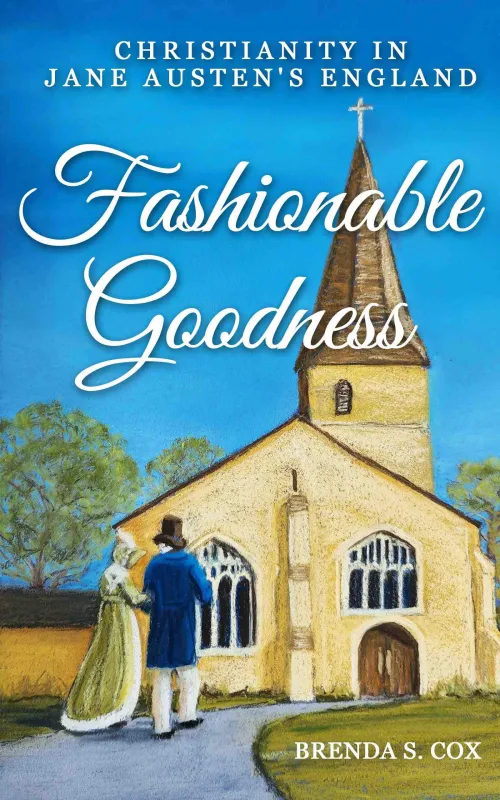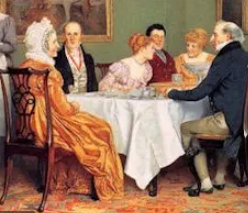In 1795 Cassandra Austen became engaged to Reverend Thomas Fowle, a man eight years her senior. He had been one of her father’s pupils and had known her since she was six years old. The engagement remained a secret, for although Tom’s cousin, Lord Craven, had appointed him his domestic chaplain and presented him with a living at the rectory of Allington in Wiltshire, the couple had almost no money, at least not enough for marriage. Since Tom’s prospects of making a decent income in the near future were slim, the couple decided to wait to marry.
 When Lord Craven sailed to the West Indies, he took Tom along with him. It took courage for Tom to make this decision, for a sea voyage was fraught with danger, but he hoped the pay off would result in his marriage to Cassandra. Correspondence between the couple would not be easy, and letters would arrive only sporadically. Tom prudently made out his will before he left, and he and Cassandra spent one last Christmas together before he set sail in the new year.
When Lord Craven sailed to the West Indies, he took Tom along with him. It took courage for Tom to make this decision, for a sea voyage was fraught with danger, but he hoped the pay off would result in his marriage to Cassandra. Correspondence between the couple would not be easy, and letters would arrive only sporadically. Tom prudently made out his will before he left, and he and Cassandra spent one last Christmas together before he set sail in the new year.
Nearly two years later, on February 1797, Tom caught yellow fever and died. Upon learning of his death months later, a broken-hearted Cassandra went into full mourning. She faced her loss with a quiet resolution that brought out her younger sister’s admiration. Jane was writing Sense and Sensibility at the time, and one wonders how much of Elinor’s stoic character was inspired by Cassandra’s restrained grieving. Later Lord Craven said he would never have taken Tom along on a dangerous voyage had he known of the younger man’s engagement. The bittersweet irony of that statement must not have been lost on Cassandra.
Jane was to later write about another fiancee’s loss in Persuasion. Like Tom, Captain Benwick waited to marry until he had made his fortune at sea. Ironically, his fiancee Fanny Harville dies without ever knowing about the Captain’s promotion or fortune. The following scene in the novel mirrors the doomed engagement of Cassandra and Tom:
Captain Benwick had some time ago been first lieutenant of the Laconia; and the account which Captain Wentworth had given of him, on his return from Lyme before, his warm praise of him as an excellent young man and an officer, whom he had always valued highly, which must have stamped him well in the esteem of every listener, had been followed by a little history of his private life, which rendered him perfectly interesting in the eyes of all the ladies. He had been engaged to Captain Harville’s sister, and was now mourning her loss. They had been a year or two waiting for fortune and promotion. Fortune came, his prize-money as lieutenant being great; promotion, too, came at last; but Fanny Harville did not live to know it. She had died the preceding summer while he was at sea. Captain Wentworth believed it impossible for man to be more attached to woman than poor Benwick had been to Fanny Harville, or to be more deeply afflicted under the dreadful change
As she wrote her novels, Jane shared her work in progress with Cassandra, her confidante. The following passage occurs near the end of Persuasion:
How eloquent could Anne Elliot have been, – how eloquent, and least, were her wishes on the side of early warm attachment, and a cheerful confidence in futurity, against that over-anxious caution which seems to insult exertion and distrust Providence! – She had been forced into prudence in her youth, she learned romance as she grew older – the natural sequel of an unnatural beginning.
When Cassandra had finished reading this passage, she “marked it and added in the margin, ‘Dear dear Jane! This deserves to be written in letters of gold.’ (Grosvenor Myer, p. 54.) More than any action, those written words express the extreme anguish Cassandra must have felt on learning of Tom’s death. They had been so cautious! But had they been ‘over-anxious cautious?’ Is that why the words should have been written in gold? Had Cassandra been able to turn back the clock, would she have married Tom regardless of their lack of money? Would a less prudent Cassandra have encouraged him to tell Lord Craven about their engagement?
 In his will, Tom left his fiancee a legacy of 1,000 pounds. The interest from that money would help to support Cassandra for the rest of her life, especially after the death of her father, when the small amount would help to augment the income the Austen brothers contributed to the living expenses of their mother and sisters.
In his will, Tom left his fiancee a legacy of 1,000 pounds. The interest from that money would help to support Cassandra for the rest of her life, especially after the death of her father, when the small amount would help to augment the income the Austen brothers contributed to the living expenses of their mother and sisters.
While Cassandra would mourn Tom until she died, Captain Benwick’s heart was not so constant. Although he grieved for Fanny, his heart was soon consoled by Louisa. Jane made her point about the constancy of a woman’s heart through Anne Elliot’s unforgettable statement:
“The one claim I shall make for my own sex is that we love longest, when all hope is gone.”
- Grosvenor Meyer, Valerie, Jane Austen: Obstinate Heart (Arcade Publishing, 1997)
- Spence, Jon, Becoming Jane Austen, New York, 2003
- Aiken Hodge, Jane, Only a Novel: The Double Life of Jane Austen, New York, 1972
Image of Cassandra (?), JASA
Technorati Tags: Jane Austen, Masterpiece Classic, Jane Austen Novels, Jane Austen Regency
Read Full Post »
 Jane Austen was born on a bitterly cold night on December 16, 1775.
Jane Austen was born on a bitterly cold night on December 16, 1775.













